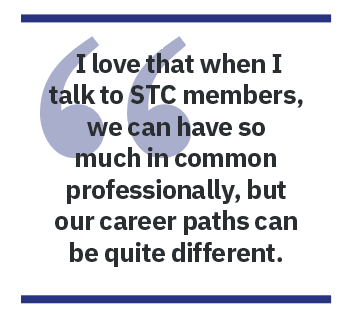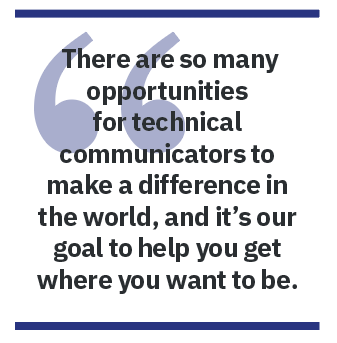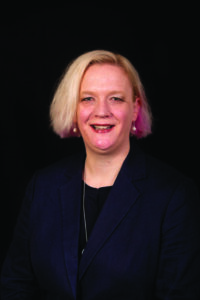By Kirsty Taylor | STC President
I feel really lucky to have found technical communication as a career. When I left high school, I thought I wanted to be a German-speaking information technology (IT) person. In high school, I’d been good at German and IT, and I couldn’t figure out what career would combine those skills. At uni, I started doing an IT degree, and after three years, I finally admitted to myself that I didn’t want to become a software engineer. I swapped courses, studied business German and linguistics as my majors in an Arts degree. I was so much happier, and my marks showed it. Towards the end of uni, I did a week of work experience with a small, local software development company that developed insurance software. I’d found the career for me!
 After graduating, I found my first technical writing role working with a telecommunications software company. For over 20 years, I’ve continued working in technical communication in software development. My roles have changed — I worked as a technical writer, technical editor, tech comm project manager, team leader, content manager — but I’ve found each to be challenging and satisfying. Over the past 12 years, I’ve developed expertise in other areas, including software and content localization, ISO auditing, as well as working with key customers in customer support.
After graduating, I found my first technical writing role working with a telecommunications software company. For over 20 years, I’ve continued working in technical communication in software development. My roles have changed — I worked as a technical writer, technical editor, tech comm project manager, team leader, content manager — but I’ve found each to be challenging and satisfying. Over the past 12 years, I’ve developed expertise in other areas, including software and content localization, ISO auditing, as well as working with key customers in customer support.
I truly believe that the foundational skills of technical communication — analyzing and explaining complex, technical concepts, asking questions and listening, and being curious — are key to us developing our careers in technical communication. There are many paths a technical communication career can take — in different industries, different technical domains, different specializations, or even applying your technical communication skills to completely different roles in marketing or localization or project management.
 I love that when I talk to STC members, we can have so much in common professionally, but our career paths can be quite different. I can learn so much from the members I talk to, about their specific career path, as well as what they’ve learned in their specific industry segments, or the way they’ve applied their tech comm skills to different roles. I haven’t had to work with the strict rules of say, medical devices, but I am grateful for the technical communicators who create the instructions I follow so that I know how to use a device properly. Some of us spend years honing specific technical communication skills, developing deep knowledge in tech comm, or in a specific industry. Others apply their skills to different roles or industries — this versatility isn’t necessarily available with other careers, and it’s a great benefit for technical communicators around the world.
I love that when I talk to STC members, we can have so much in common professionally, but our career paths can be quite different. I can learn so much from the members I talk to, about their specific career path, as well as what they’ve learned in their specific industry segments, or the way they’ve applied their tech comm skills to different roles. I haven’t had to work with the strict rules of say, medical devices, but I am grateful for the technical communicators who create the instructions I follow so that I know how to use a device properly. Some of us spend years honing specific technical communication skills, developing deep knowledge in tech comm, or in a specific industry. Others apply their skills to different roles or industries — this versatility isn’t necessarily available with other careers, and it’s a great benefit for technical communicators around the world.
This, to me, is the beauty of STC. There are so many opportunities for technical communicators to make a difference in the world, and it’s our goal to help you get where you want to be. That’s why we offer a variety of resources for every career level, from our KnowledgeXChange for new professionals to more advanced courses that help facilitate mid-career transitions.
Do you know yet where your career path will take you? Or where you want it to go?
 KIRSTY TAYLOR (ktaylor.stc@gmail.com) is the 2021-2022 president of STC. Her recurring column will provide updates and insights on Board activities and solicit member feedback to guide ongoing decision-making.
KIRSTY TAYLOR (ktaylor.stc@gmail.com) is the 2021-2022 president of STC. Her recurring column will provide updates and insights on Board activities and solicit member feedback to guide ongoing decision-making.


